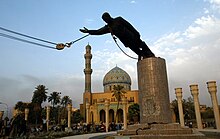Firdos Square
Al-Firdos Square ساحة الفردوس | |
|---|---|
| City square | |
 Section of Firdos Square in foreground, with Ramadan Mosque behind (2003). | |
| Location | Al-Sadoon Street and Abu-Nuw'as Street, Al-Rusafa quarter Baghdad, Iraq |
| Coordinates: 33°18′52.68″N 44°25′14.43″E / 33.3146333°N 44.4206750°E | |
Al-Firdos Square (Arabic: ساحة الفردوس, romanized: Sāḥat al-Firdaus) is a public open space in central Baghdad, Iraq. It is named after the Persian word Ferdows, which means "paradise". The site has been the location of several monumental artworks.
Al-Firdos Square is located in the middle of al-Sa'doun Street and between Tahrir and Kahramana squares and in front of the 17th of Ramadan Mosque. The square is also located opposite the Abu Nawas Street which overlooks the Tigris River. The two of the best-known hotels in Baghdad, the Palestine Hotel and the Sheraton Ishtar, are located on the square.[1]
The square is rather infamous for the toppling of the Statue of former-Iraqi President Saddam Hussein during the US-led invasion of Iraq. The image of the toppling was shown across the world and became a symbol of western victory in Iraq. At the same time, became a symbol of American Propaganda. The square is also the site of the killing of two journalists in the Palestine Hotel on the 8th of April.[2]
History[edit]

The roundabout in the center of al-Firdos Square has been the site of several monuments beginning with the completion of the monumental arch The Unknown Soldier in 1959. It was subsequently replaced by the statue of Saddam Hussein that was removed by U.S. coalition forces during the invasion of Iraq in 2003. A green, abstract sculpture by Bassem Hamad al-Dawiri was commissioned to replace the Saddam statue. In 2009, the architect of the Monument to the Unknown Soldier Rifat Chadirji expressed interest in rebuilding the monument on its original site.[3] As of 2013, the al-Dawiri statue and the surrounding columns have been removed from al-Firdos Square.[4]
Statue of Saddam Hussein[edit]

In April 2002, a 12-metre (39 ft) statue, designed by Iraqi sculptor, Khalid Ezzat, was erected in honor of Saddam Hussein's 65th birthday.[5]
In 2003, the statue was pulled down by Iraqi citizens, with the help of American forces during the invasion of Iraq in front of a crowd of around a hundred Iraqis. The event was widely televised, and some of this footage was criticized for exaggerating the size of the crowd.[6] Robert Fisk described it as "the most staged photo opportunity since Iwo Jima".[7]
Replacement statue[edit]
The site of statue now houses a green, abstract sculpture intended to symbolize freedom, designed by sculptor Bassem Hamad al-Dawiri[8] and built by a group of artists calling themselves Najin (The Survivors).[9] The replacement sculpture was constructed quickly and completed within months of its predecessor's removal.
Of necessity, the statue makes use of basic construction materials and methods. It is made of painted plaster, seven meters (23 feet) in height, and includes a symbolic Iraqi family holding aloft a crescent moon, which represents Islam, and the sun represents the ancient Sumerian civilization.[10]
2005 protest[edit]
On April 9, 2005, the second anniversary of the invasion of Iraq, the square was the center of a large-scale demonstration from tens of thousands of Iraqis protesting the American occupation. The demonstration was organized by Muqtada al-Sadr, a Shi'a cleric, and supported by Sheikh Abd al-Zahra al-Suwaid, a follower of the Green Party. Suwaid was quoted as stating to the gathered "The rally must be peaceful. You should demand the withdrawal of the occupation forces and press for quicker trials for Saddam Hussein and his aides before an Iraqi court."
Reconstruction of the square[edit]
The square remained an empty desert for years despite the large sums of money that entered the country. There was many attempts by the Municipality to rehabilitate the square until recently in 2020, the Iraqi private sector, through the Association of Iraqi Private Banks and in cooperation with the Central Bank, completely reconstructed the square and opened it to the public in hopes to leave behind its past and transform it into a cultural hub.[1]
See also[edit]
References[edit]
- ^ a b "بالصور- شهدت إسقاط تمثال صدام حسين.. ساحة الفردوس ببغداد تبعث للحياة مجددا | أخبار سياسة | الجزيرة نت". 2022-09-11. Archived from the original on 2022-09-11. Retrieved 2023-08-16.
- ^ "The toppling of Saddam's statue: how the US military made a myth | Saddam Hussein | The Guardian". amp.theguardian.com. Retrieved 2023-08-16.
- ^ "Famed Iraqi architect rebuilds Baghdad landmark"
- ^ AP Photo/Hadi Mizban "Yahoo! In this Sunday, April 7, 2013 photo, a general view of Firdous Square, where the statue of Saddam Hussein was pulled down by U.S. forces and Iraqis on April 9, 2003, in central Baghdad, Iraq. Ten years ago, a statue fell in Paradise Square. Joyful Iraqis helped by a U.S. Army tank retriever pulled down their longtime dictator, cast as 16 feet of bronze. The scene broadcast live worldwide became an icon for a war, a symbol of the final victory over Saddam Hussein. But for the people of Baghdad, it was only the beginning. The toppling of the statue on April 9, 2003, remains a potent symbol that has divided Iraqis ever since."
- ^ Lucas, Dean (2007). "Famous Pictures Magazine - Fall of Saddam Hussein's Statue". Famous Pictures Magazine. Retrieved 2007-07-16.
- ^ "Doctored Photo from the London Evening Standard", The Memory Hole, May 13, 2003
- ^ "Lights, camera, rescue", Seattle Post-Intelligencer, May 30, 2003
- ^ "Radical cleric urges protest at the square where Saddam's statue was toppled". St Louis Post Dispatch. April 10, 2005. Retrieved 5 March 2010.
- ^ "New Statue Replaces Saddam", BBC News, 30 May 2003,Online:
- ^ "New Statue Replaces Saddam", BBC News, 30 May, 2003,Online:


 French
French Deutsch
Deutsch